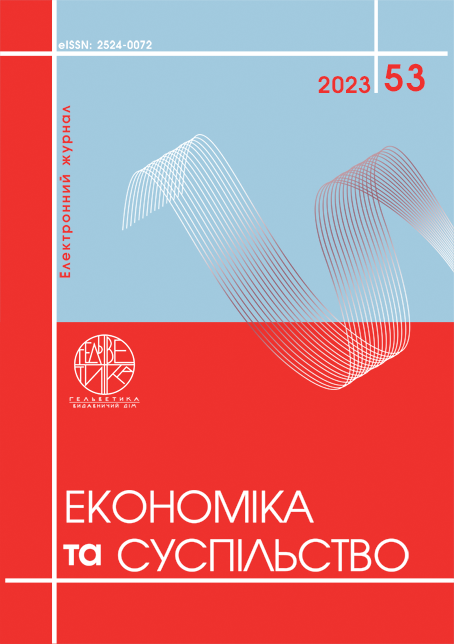EFFICIENCY OF STATE ENERGY POLICY OF UKRAINE: NATIONAL AND INTERNATIONAL DIMENSION
Abstract
The article is devoted to the study of the international and national dimensions of the evaluation of the state energy security of Ukraine, the determination of the role of excessive energy consumption in the system of global transformation of the energy system. The purpose of the study is to evaluate the effectiveness of the transformation of the state energy policy of Ukraine from the point of view of increasing its transparency and bringing it into line with international standards. The object of the study is indicators of the effectiveness of the country's state energy policy. The results of the systematization of literary sources on the issue of assessing the effectiveness of the state policy of the country proved the absence of comprehensive studies on this topic and the ambiguity of approaches to the determination of indicators characterizing the state energy policy. Based on a comparative analysis of the Energy Transition Index of Ukraine and EU countries, it was concluded that the state energy policy is insufficiently effective in the direction of reforming the state energy market of Ukraine and bringing it into line with the requirements of the international community. One of the indicators for evaluating the effectiveness of the country's energy policy is the Energy Transparency Index. Based on a retrospective analysis of the positioning of Ukraine according to the Energy Transparency Index, a conclusion about its significant decrease during the period of military operations on the territory of Ukraine was made. The structural analysis of the Energy Transparency Index proved that production and consumption of oil and liquid fuel and thermal coal are characterized by the least transparency. Based on the results of the study, was made a conclusion about the need to transform the state energy policy both at the national level (increasing the quality of work of state institutions, strengthening responsibility for excessive energy consumption) and at the level of individual economic entities (increasing responsibility for excessive energy consumption, encouraging the transition to renewable sources).
References
The Global Risks Report 2023 18th Edition. World Economic Forum. Geneva, Switzerland. URL: https://www.weforum.org/reports/global-risks-report-2023 (дата звернення: 02.07.2023).
Ortiz D., Leal V. Energy Policy Concerns, Objectives and Indicators: A Review towards a Framework for Effectiveness Assessment. Energies. 2020. Vol. 13. P. 6533.
Collado R. R., Díaz M. T. S. Analysis of energy end-use efficiency policy in Spain. Energy Policy. 2017. Vol. 101. P. 436–446.
Yuan M., Tuladhar S., Bernstein P., Lane L. Policy Effectiveness in Energy Conservation and Emission Reduction. Strategies for Mitigating Climate Chang. Energy. 2011. Vol. 32. P. 153–172.
Rosenow J. A. N., Leguijt C. O. R., Pato Z., Eyre N. An ex-ante evaluation of the EU Energy Efficiency Directive-Article 7. Economics of Energy and Environmental Policy. 2016. Vol. 5. P. 45–64.
Fostering Effective Energy Transition 2023 Edition. World Economic Forum. Geneva, Switzerland. URL: https://www3.weforum.org/docs/WEF_Fostering_Effective_Energy_Transition_2023.pdf (дата звернення: 02.07.2023).
Індекс прозорості енергетики України. URL: https://index.ua-energy.org/ (дата звернення: 02.07.2023).
Про затвердження Національної економічної стратегії на період до 2030 року: постанова Кабінету Міністрів України від 3 березня 2021 року №179. URL: https://zakon.rada.gov.ua/laws/show/179-2021-%D0%BF#Text (дата звернення: 02.07.2023).
The Global Risks Report 2023 18th Edition. World Economic Forum. Geneva, Switzerland. Available at: https://www.weforum.org/reports/global-risks-report-2023 (accessed July 02, 2023).
Ortiz D., Leal V. (2020). Energy Policy Concerns, Objectives and Indicators: A Review towards a Framework for Effectiveness Assessment. Energies, vol. 13, p. 6533.
Collado R. R., Díaz M. T. S. (2017). Analysis of energy end-use efficiency policy in Spain. Energy Policy, vol. 101, pp. 436–446.
Yuan M., Tuladhar S., Bernstein P., Lane L. (2011). Policy Effectiveness in Energy Conservation and Emission Reduction. Strategies for Mitigating Climate Chang. Energy, vol. 32, pp. 153–172.
Rosenow J. A. N., Leguijt C. O. R., Pato Z., Eyre N. (2016). An ex-ante evaluation of the EU Energy Efficiency Directive-Article 7. Economics of Energy and Environmental Policy, vol. 5, pp. 45–64.
Fostering Effective Energy Transition 2023 Edition. World Economic Forum. Geneva, Switzerland. Available at: https://www3.weforum.org/docs/WEF_Fostering_Effective_Energy_Transition_2023.pdf (accessed July 02, 2023).
Indeks prozorosti enerhetyky Ukrainy [Energy Transparency Index]. Available at: https://index.ua-energy.org/ (accessed July 02, 2023).
Pro zatverdzhennia Natsionalnoi ekonomichnoi stratehii na period do 2030 roku: postanova Kabinetu Ministriv Ukrainy vid 3 bereznia 2021 roku №179 [On the approval of the National Economic Strategy for the period up to 2030: Resolution No. 179 of the Cabinet of Ministers of Ukraine dated March 3, 2021]. Available at: https://zakon.rada.gov.ua/laws/show/179-2021-%D0%BF#Text (accessed July 02, 2023).

This work is licensed under a Creative Commons Attribution 4.0 International License.


